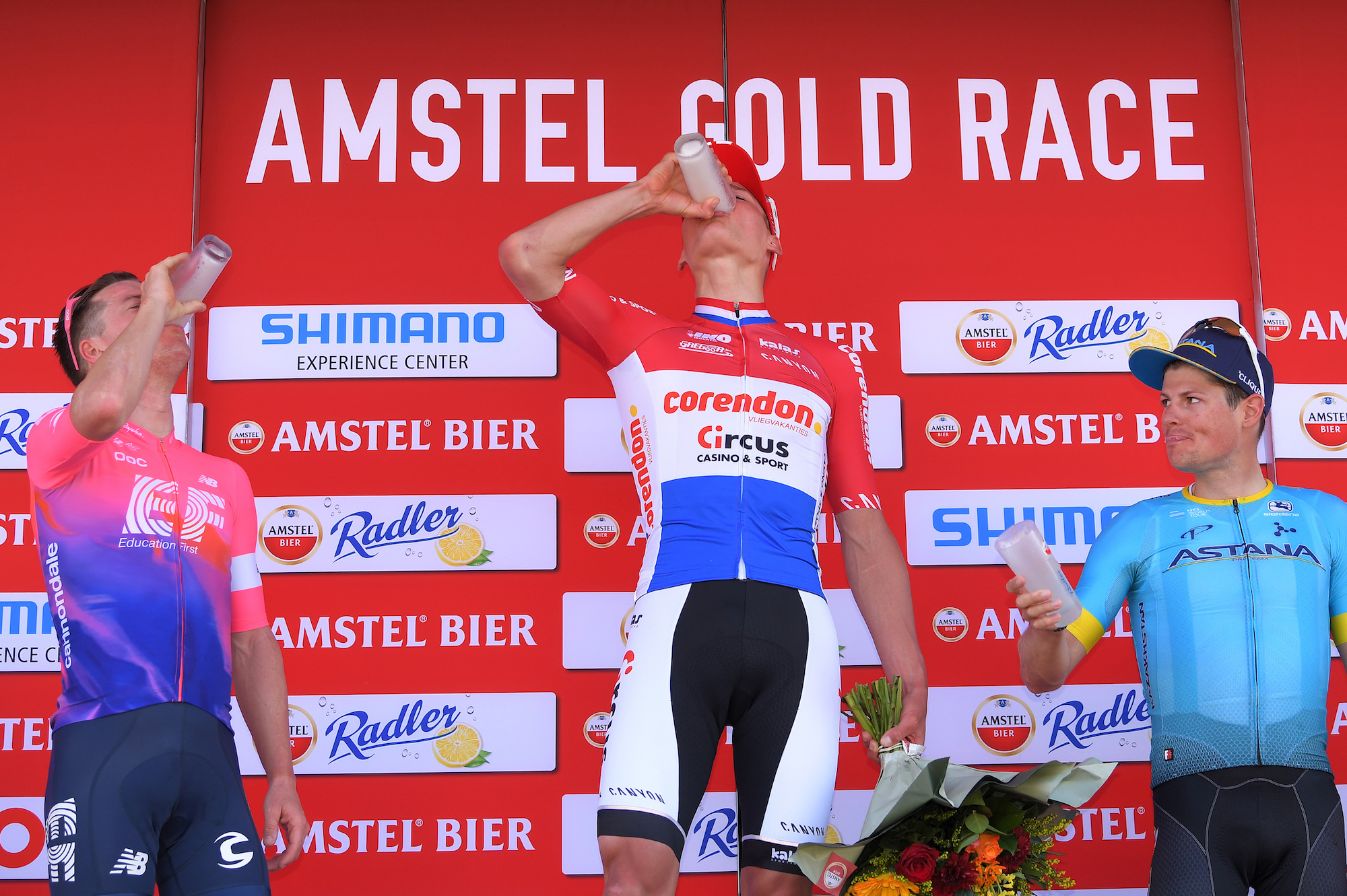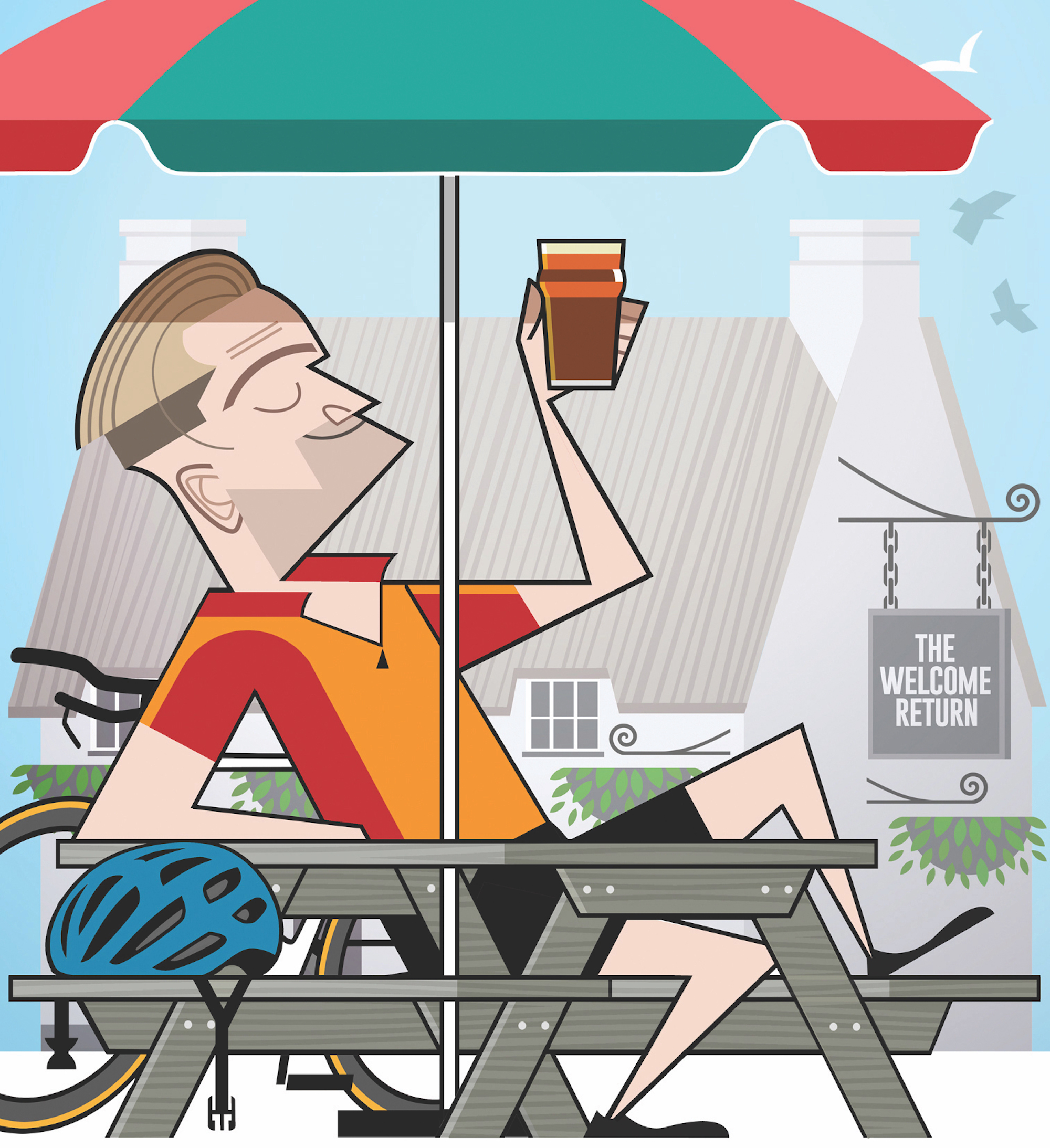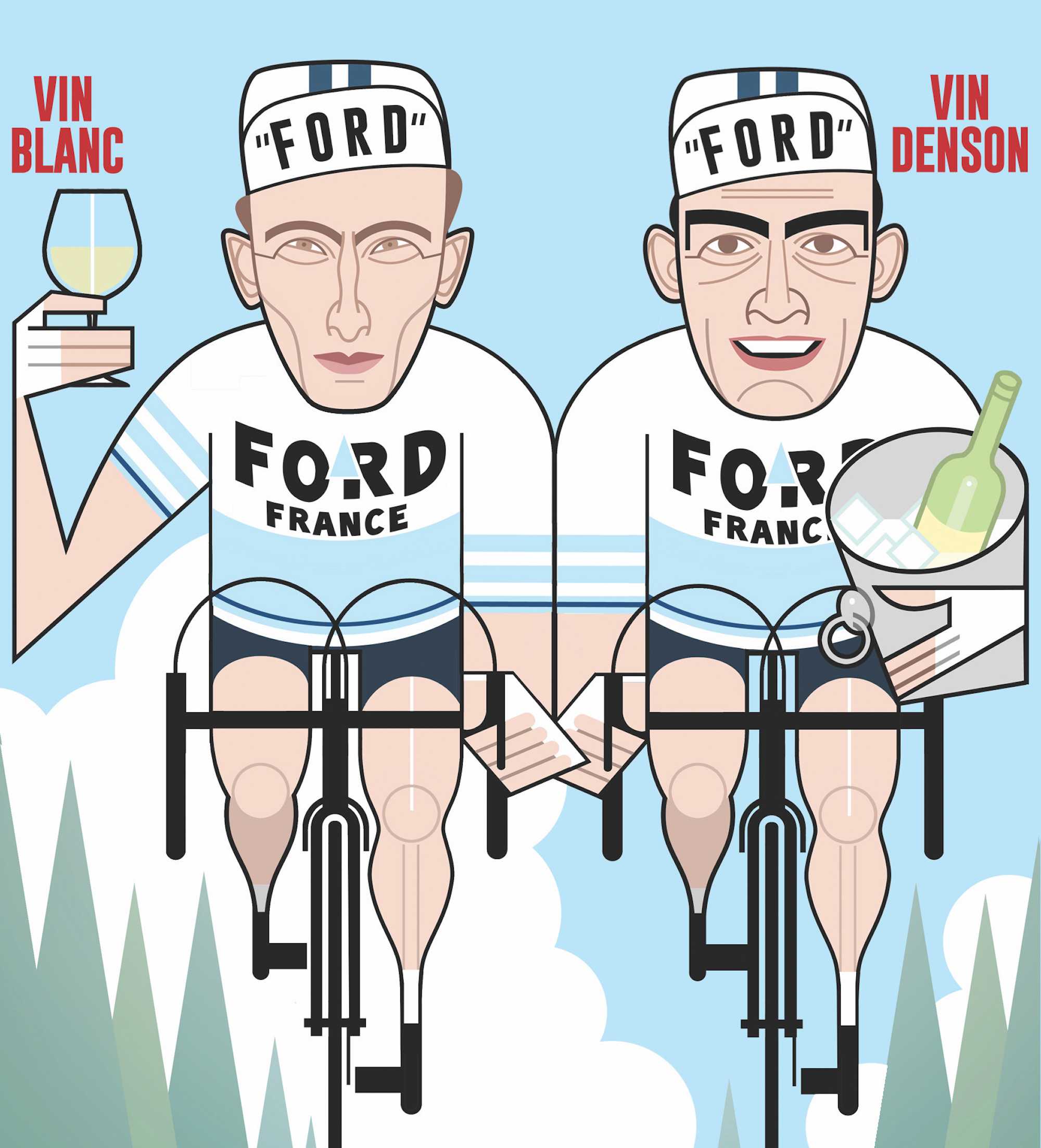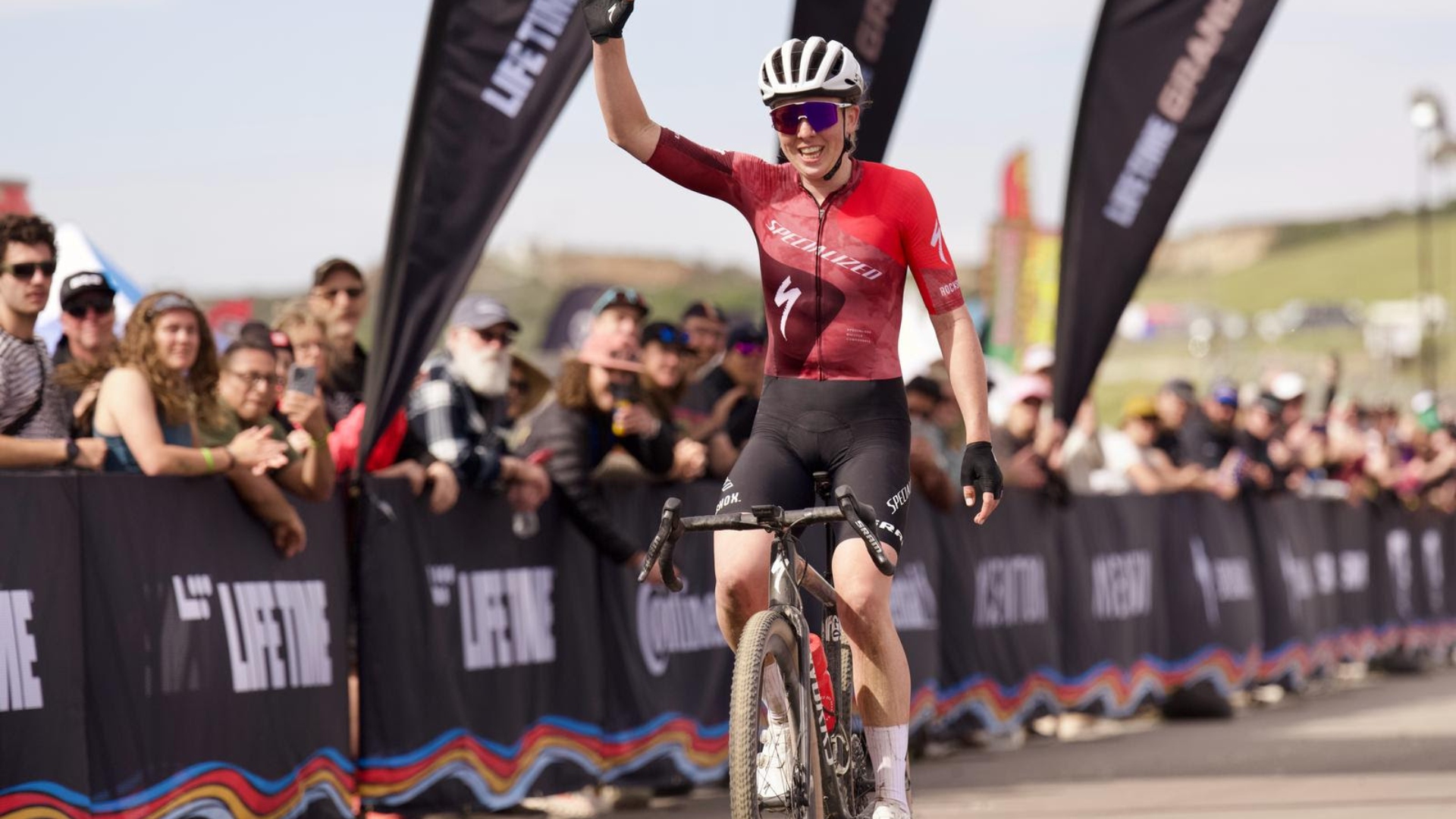You booze, you lose? How much does drinking undermine fitness gains?
Most of us like a drink, at least occasionally. But does boozing undo the fitness gains we work so hard for? Chris Marshall-Bell investigates

Mathieu van der Poel on the podium of the 2019 Amstel Gold Race (Photo by Luc Claessen/Getty Images)

You’ve just completed a hard week’s training, you know your fitness is improving, but that shelf-full of ice-cold beers in the fridge is an irresistible temptation. You’d planned on treating yourself to just one or two, but two leads to three leads to four…and the next day your head is throbbing; you feel physically wretched. Rightly or wrongly, for many of us drinking is go-to stress-buster. But few of us drink without an accompanying twinge of guilt or worry about the effects on our fitness.
The morning after a heavier-than-planned boozing session, as you lounge around in Planet Pity, you utter the empty pledge: "I’m never drinking again" – making you a sitting duck for sarcasm when you next raise a drink to your lips. But should you make a firm commitment to drink less? Or should you, for the sake of your cycling, stop drinking alcohol altogether?
A couple of years ago it was revealed that riders and all staff from WorldTour team Lotto-Soudal have been banned from drinking during key blocks of training and races (except for small amounts following a victory or birthday). In doing so, they put the age-old conundrum back at the forefront in the minds of amateur and professional cyclists: I enjoy a drink, but is it harming my riding?
The science is indisputably clear. "There are no nutritional benefits of alcohol whatsoever," David Cameron-Smith, Professor of Nutrition at the Singapore Institute of Clinical Sciences, tells Cycling Weekly.
The facts that count against alcohol are almost overwhelming: the body cannot convert alcohol into glycogen, the essential fuel source necessary for exercise; instead, the body either burns it off or converts it into fat and stores it in fatty tissue.
This is where the infamous ‘beer belly’ myth comes from. Fat around the mid-section area is caused by too many calories from whatever source, not just beer. But the body burns alcohol preferentially and so ‘protects’ fat stores by skipping ahead of them in the queue for the metabolic furnace – there’s no hiding from the fact that surplus calories from boozing result in more body fat. Every gram of alcohol packs in seven calories (versus 4kcal per gram in carbohydrate), with many beers tipping past the 200kcal mark per pint. In a sport where every half-kilo matters, unnecessary calories are the enemy of optimum performance. What’s more, excessive alcohol intake reduces the secretion of human growth hormone by up to 70 per cent, meaning the body can’t adapt to training as well as it should; muscle development and growth is impeded. Testosterone levels may take a hit too.
There are of course more frightening risks linked to alcohol. Just a few drinks a week can increase blood pressure and your risk of heart disease. Studies have also shown that alcohol, especially in ‘binge’ doses, can lead to an irregular and/or faster heartbeat, and is associated with the condition atrial fibrillation. Scarier still, there is a proven link between alcohol and cancer – especially of the mouth, throat, liver and breast. Strikingly, the NHS advises that there is "no safe limit" for alcohol, but urges us to drink no more than 14 units per week, and no more than half that amount in a single session.
Get The Leadout Newsletter
The latest race content, interviews, features, reviews and expert buying guides, direct to your inbox!

Does drinking alcohol affect cycling performance?
Most consequences of alcohol are intangible at first, but there are some short-term repercussions – especially if you’re riding the day after having a few drinks. The most notable is disrupted sleep. Professor Cameron-Smith explains: "The resulting tiredness affects your mental alertness and concentration. And when you need to focus, to make decisions in an instant, these effects can have a profound impact on where you finish in the bunch."
Of course, you may not realise you’re tired – until it has a harmful effect. As Cameron-Smith notes, our cognitive functions are impaired and the likelihood of having an accident increases when alcohol – however minimal – is in our system.
"A tired person doesn’t have that level of attention to their surroundings compared to a person who has their full capabilities. It can have real-world impacts, too: you’re not as attentive as you usually would be to what’s going on around you."
The chemical name of alcohol is ethanol, which is broken down by the liver – but that takes time. On average, it takes about an hour to break down one unit of alcohol (half a pint of beer); three pints of strong ale will take around nine hours. Aside from the cognitive effects, chemical changes and imbalances in the body include a decline in the production of anti-diuretic hormone, meaning less water is absorbed into the body and more is lost through urination.
When drinking heavily, the body prioritises removing the toxins from the alcohol, which negatively impacts the production of glucose and related hormones, causing a decrease in the effectiveness of insulin. This leads to unstable blood sugar levels, a particular problem for diabetics – and potentially a fuelling problem for cyclists.
"The fluid shifts in your body and kidney functioning are affected, and [after binge drinking] it is close to 24 hours before you get yourself back to normal," Cameron-Smith adds. "It takes longer than most people think, as it involves hormonal changes. There are significant changes in salt and sodium balance too, and all these things are markedly disturbed, if not stuffed up, by having three pints."
The effects are not only physical, but mental too. Sports psychologist Andy Lane, a professor at the University of Wolverhampton, explains: "For some athletes, drinking plants a seed that they have done something derogatory to their training; this can be bad for the mind."
Drinking then becomes a source of self-doubt. "When they get closer to the competition and the nerves increase, they start to think they made a massive error having had a few drinks, or they reflect on the training sessions when they didn’t go quite as well.
"This causes worry, and those doubts become powerful. The possibility of not doing so well then increases, so you have to be satisfied with drinking [in the first place]."
Amateur racer Ian Manley told me how he recently cut back his alcohol intake and saw dramatic benefits. "In two months since I all but stopped, I lost three kilograms, and that’s a big drop from 71kg. In the past when I have lost weight cycling, I felt my power drop off too, but this time I maintained my power. The difference has been significant."

"A tired person doesn’t have that level of attention to their surroundings compared to a person who has their full capabilities. It can have real-world impacts, too: you’re not as attentive as you usually would be to what’s going on around you."
There can be a temptation to congratulate oneself after a tough ride and reach for a drink – but this is an indulgence best avoided, according to Glen Davison, a sports scientist at the University of Kent: "Alcohol can distort the glycogen replenishment into the muscle. It affects your hydration status and it might affect the general status of the muscles and cells and how they can effectively adapt and recover."
Davison explains that the body needs time to make adaptations during the recovery period, and alcohol interferes with this process.
"It will have indirect effects such as in the gut, where it can cause damage at the gut lining, affecting the permeability of the cells that are at more risk during an intense training block, especially in warmer weather. Alcohol increases the consequences of heat stress and exertion, and the impact on your immune system makes you more likely to pick up an illness."
Alcohol is a relaxant; it relieves us of social anxiety and makes us disinhibited, which can feel freeing. Therefore many of us are not prepared to forgo it, just like we aren’t prepared to turn down a pizza slice when it’s offered to us. The de-stressing effects are pleasant and arguably even healthy – if drinking in moderation. We’d be kidding ourselves to propose that British cyclists go teetotal en masse.
"The fluid shifts in your body and kidney functioning are affected, and [after binge drinking] it is close to 24 hours before you get yourself back to normal," Cameron-Smith adds. "It takes longer than most people think, as it involves hormonal changes. There are significant changes in salt and sodium balance too, and all these things are markedly disturbed, if not stuffed up, by having three pints."
How to balance cycling and drinking
So what is the best way to keep alcohol as a safe and responsible friend in our life? "Evidence suggests the risks of alcohol are reduced if drinking is spread throughout the week," Cameron-Smith says. "More frequently drinking small amounts is better than occasionally drinking huge volumes."
According to the science, a daily intake of up to 10 grams of alcohol has minimal effect on the body. That equates to a small (125ml) glass of wine or a small bottle of beer. In Davison’s view: "A binge once every five weeks is the worst thing you can do. It might not have direct negative effects on training adaptation, but it increases the risk of short-term illness significantly, especially if you’re training hard."
Psychologist Lane agrees: "You might say, ‘It doesn’t count because it’s Friday night,’ or, ‘It’s my friend’s birthday.’ It does count, and that excuse doesn’t work. It all goes in there and the body still has to get rid of it. If you are trying to get to a better level of fitness, it’s best not to drink heavily."
Drinking then becomes a source of self-doubt. "When they get closer to the competition and the nerves increase, they start to think they made a massive error having had a few drinks, or they reflect on the training sessions when they didn’t go quite as well.
Once on your bike, rid your mind of the conception of sweating the alcohol out of your system. That is another myth, and the alcohol makes you more prone to dehydration. Cameron-Smith advises: "Schedule a ride, but for later on – give yourself several extra hours of recovery after waking. You will still benefit from the training but, being hungover, you might not train as well. It’s important not push to yourself too hard."
It’s reassuring to know that a hangover ride can still produce a smattering of benefits – although one study suggests performance during a hangover decreases by up to 11 per cent. Veteran track rider Paul Stewart speaks for most of us when he describes how such a ride feels. "When I go for a ride the day after drinking, I tend to be more lethargic and not quite ‘with it’. I feel a little bit behind where I should be, like when you’re at the beginning of a cold." One year, a particularly drink-heavy Christmas damaged Stewart’s form. "My form was good before Christmas, but when I came back I had dropped quite a bit, and it was shocking to me. I have a good snap, but that sharpness had gone out of my sprint. It took a few weeks to come back."
Read more about drink riding, how much is too much before you get on your bike over here.
Benefits of alcohol for cyclists
Anecdotal and psychological scientific evidence don’t complete the story; it’s not as simple as giving up booze to go faster. Lane believes that removing alcohol can make it harder to sustain a positive mindset.
Why do cyclists drink alcohol?
"Alcohol is a stimulus that signals total disconnect from sport," Lane acknowledges. "It’s a signal to relax, and that is a good thing for athletes who are constantly engaged in sport all of the time. If you are going to ban it, then you need to replace it with another trigger that says, ‘This is the time to stop thinking about sport’."
In other words, everyone needs a mechanism by which to switch off their ‘serious cyclist’ mode for a while. "If you don’t find the replacement, the athlete doesn’t learn how to relax, and that becomes a problem. You have to introduce new relaxation skills."
Stresses of competition and satisfying expectations can lead pro cyclists to drink more and more and become dependent. One former team manager CW spoke to confided: "I know for sure, 100 per cent, there are functioning alcoholics in the peloton. They are so strict with everything else that they feel like they can justify it from a psychological point of view, and it’s not illegal, so they can do it."
It is the psychological impact of alcohol that makes this topic so complex, and it’s why there is no straightforward answer. The mental benefits of moderate alcohol consumption should not be underestimated; you may benefit more from reducing your alcohol intake rather than removing it completely.
Drinking sensibly doesn’t appear to have any major physiological detriment to our fitness or our athletic goals. That said, very few studies have been undertaken assessing moderate drinking on athletic performance, so we’re somewhat reliant on educated assumptions and beliefs.
Letting yourself relax with a couple of pints while watching your latest favourite Netflix series can make the difference between maintaining motivation and becoming so fixated on your cycling objective that your sporting life crumbles around you. Of course, if your goal event is imminent, it’s advisable to avoid drinking until afterwards, for if you have meticulously prepared every other aspect of your training, why let a drink potentially deny you that crucial extra watt or percentage of alertness?
This feature originally appeared in the print edition of Cycling Weekly, on sale in newsagents and supermarkets, priced £3.25.

Thank you for reading 20 articles this month* Join now for unlimited access
Enjoy your first month for just £1 / $1 / €1
*Read 5 free articles per month without a subscription

Join now for unlimited access
Try first month for just £1 / $1 / €1
A freelance sports journalist and podcaster, you'll mostly find Chris's byline attached to news scoops, profile interviews and long reads across a variety of different publications. He has been writing regularly for Cycling Weekly since 2013. In 2024 he released a seven-part podcast documentary, Ghost in the Machine, about motor doping in cycling.
Previously a ski, hiking and cycling guide in the Canadian Rockies and Spanish Pyrenees, he almost certainly holds the record for the most number of interviews conducted from snowy mountains. He lives in Valencia, Spain.
-
 'I gave it everything I had' - Keegan Swenson and Haley Batten win Sea Otter Classic Gravel
'I gave it everything I had' - Keegan Swenson and Haley Batten win Sea Otter Classic GravelOlympic medalist mountain biker Batten crushes her first gravel race; Swenson and Villafane slip into familiar Life Time Grand Prix series leads
By Ryan Simonovich Published
-
 I have been capturing my cycling adventures for over 20 years, and two of the best action cameras for cyclists have just hit their lowest prices on Amazon
I have been capturing my cycling adventures for over 20 years, and two of the best action cameras for cyclists have just hit their lowest prices on AmazonDeals Amazon has slashed the price on Insta360 cameras, including the highly rated X3, which has a huge 30% off
By Paul Brett Published